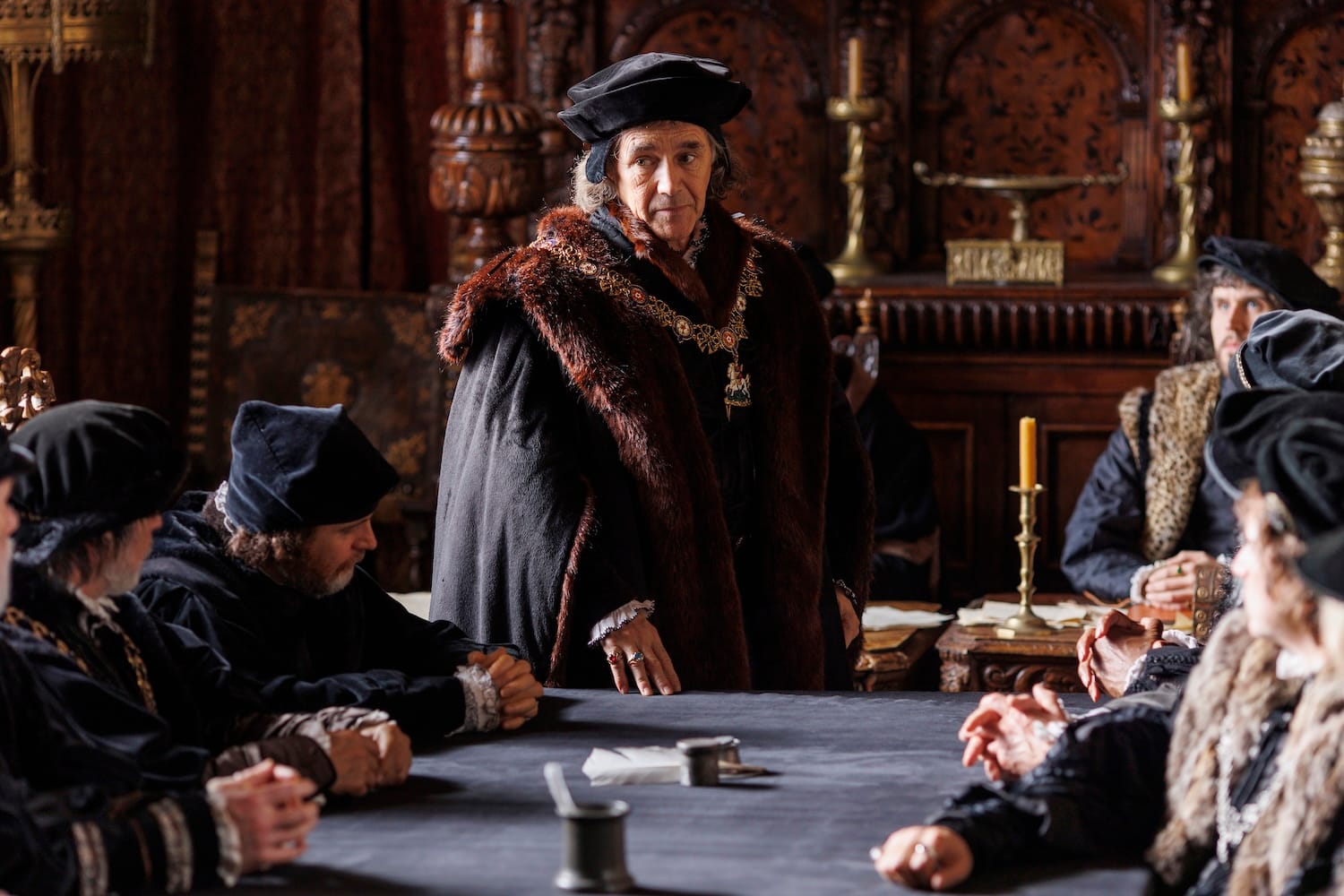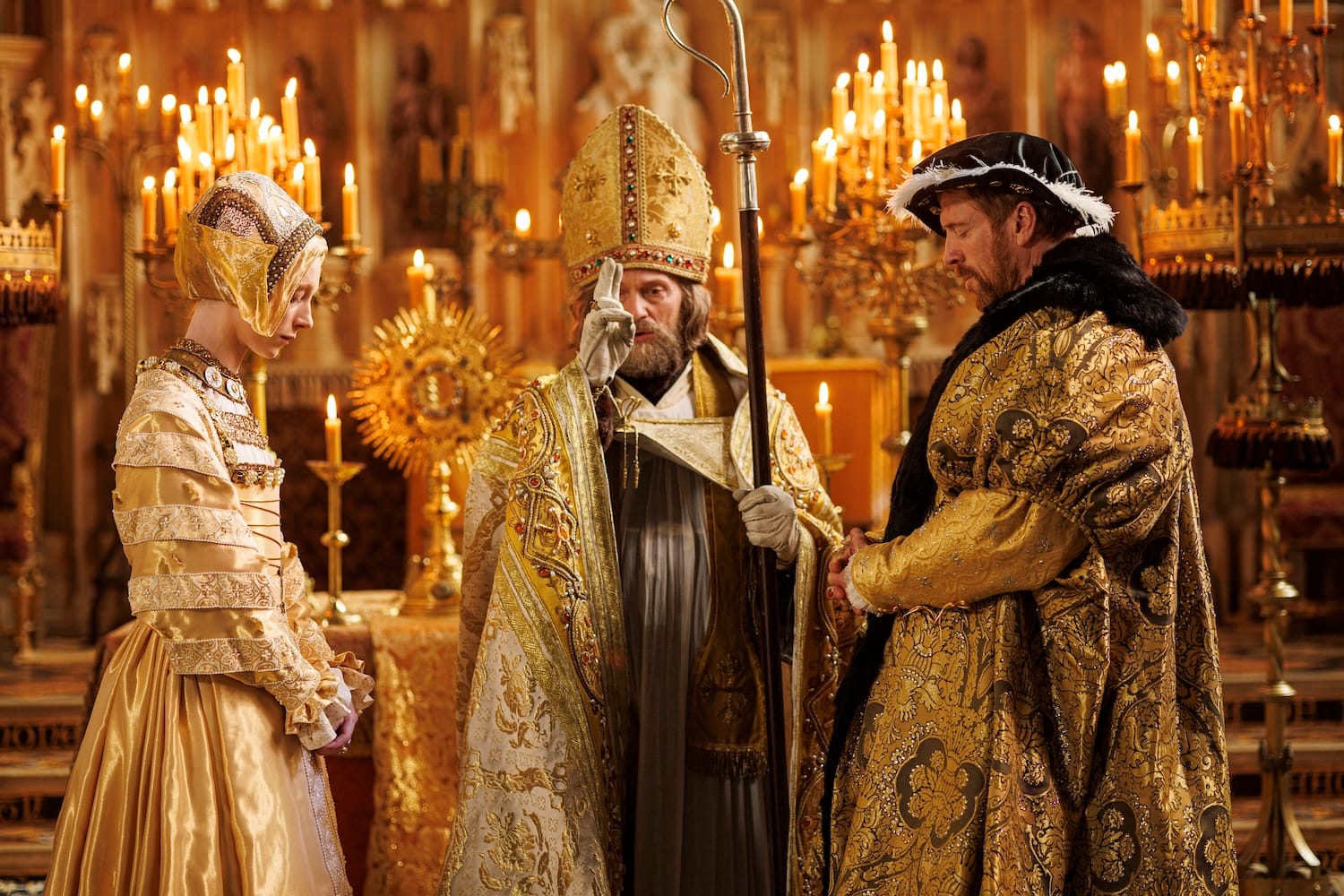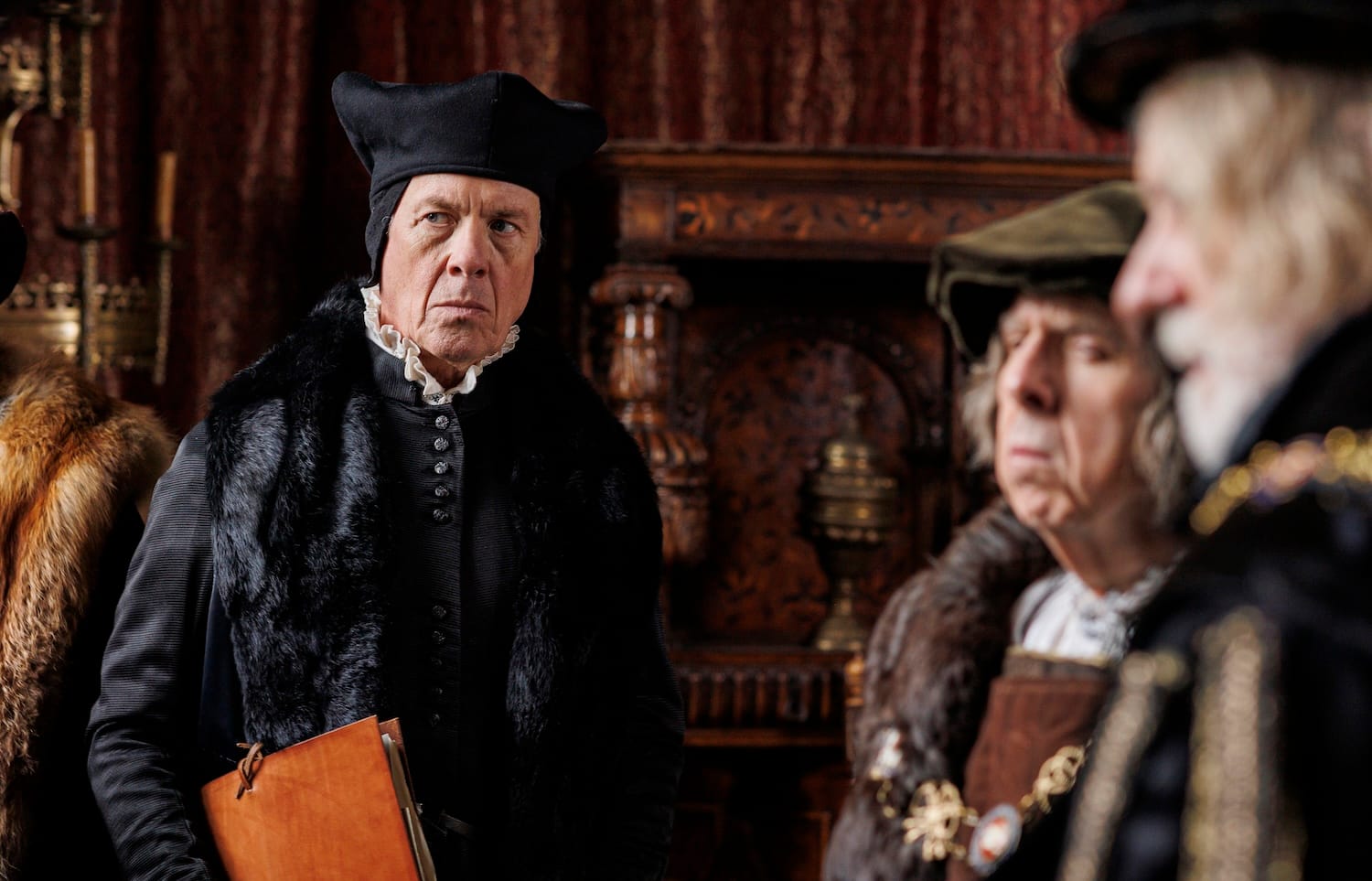"Mirror" Reflects Cromwell's Doom in the Penultimate Episode of 'Wolf Hall'

The penultimate episode of Wolf Hall: The Mirror and the Light finally sees Thomas Cromwell's luck run out. It's a testament to this show's quality that this development — a well-documented historical fact! — manages to feel shocking. A sense of vague doom has followed Cromwell throughout this series, a constant feeling of being under threat that the man himself clearly understands, considering that he walks around heavily armed. Yet, even as we watch Henry slowly turn against his previously most trusted servant, it's easy to assume that Cromwell will somehow manage to avoid the arrest everyone else can see coming.
"Mirror" is an hour in which a surprising amount happens, but whose most important scenes are the ones we don't see. The real action of this episode unfolds in the story's margins and gaps, during moments that occur off-screen or in the background of other scenes. It's the first time we've ever seen Cromwell so distant from the story's main action. However, it's challenging to ascertain precisely how far he is from its center until he's arrested, and it becomes clear just how many people have been working against him without his knowledge, and how many conversations must have taken place without him.
There are many candidates in the former category: Norfolk resuscitating the rumor that Cromwell has designs on Mary, even as he positions yet another attractive young niece in the rooms of a queen the king doesn't particularly like; Gardiner, pointing out how closely Cromwell's beliefs skirt Lutheranism and heresy. There is also Fitzwilliam, desperate for anything that might convince Henry it's not his fault the new queen displeases him, throwing blame at his former friend. There were even secret negotiations with the French, clandestine meetings, and gift exchanges with young lady's maid, Katherine Howard. Cromwell misses it all.

Mark Rylance in "Wolf Hall: The Mirror and the Light"
Given how influential the king's marriage to Anne of Cleves is in Cromwell's eventual downfall, it's a bit surprising to realize the poor woman appears on screen for something approximating sixty seconds. However, Anne herself, as a person, doesn't matter much to Henry or the men around him. The men may debate her attractiveness, mock her education, and lack of social graces or pastimes, but they know very little about her and care to learn even less.* It's the idea of this marriage that obsesses the council, and the purported safety of a union with the Protestant princes of Germany provides against the combined forces of England and Spain.
(*To Cromwell's credit, he at least tries to make sure she'll have food she likes at court!)
From Cromwell, it's something more than that. It's his big swing at legacy, a chance at literally rewriting the map of the world, at least in religious terms. If he can bind England to the Protestant rulers of Europe, then he can solidify his Reformation in a way that is more lasting and permanent than the whim of a single monarch. The show doesn't explicitly state it, but it's also likely a deliberate choice to turn to the German princes, who generally practice a much stricter form of the new faith than some. Technically, Norfolk spends half this episode complaining about the loss of a monastery of priests to pray for the soul of his father, an act that the new queen's Lutheran brother would almost certainly not approve of. (Lutherans, traditionally, do not believe in Purgatory, nor do they pray for the dead since the departed already rest with God.)
As for Henry, well, he's just upset that his new bride isn't as attractive as he was led to believe she would be.

Damian Lewis and Dana Herfurth in "Wolf Hall: The Mirror and the Light"
Popular wisdom holds that Henry rejected his fourth wife because she was less attractive than Hans Holbein's famous painting of her implied her to be. The Mirror & the Light suggests things were likely slightly more complicated than that, via its (admittedly hilarious) scene of Henry digging through his cosplay closet looking for just the right disguise to use to surprise his new wife. That alone is all kinds of crazy on its face: What woman, newly arrived in a country whose language she doesn't speak, to marry a stranger she's never met, wants to meet that man while he's potentially disguised as a Magi??
In this version of events, the rejection is much more about Henry's public humiliation. Anne doesn't recognize him and recoils when she learns who the old, fat man with a bad leg who has been pestering her actually is; it is, honestly, a fair reaction. By this point in his life, Henry Tudor had to be the world's most obvious example of someone whose dating app profile picture did not match their real-life appearance.

Alex Jennings in "Wolf Hall: The Mirror and the Light"
His petulant, whiny attempts to get out of the marriage couldn't possibly be more obvious. His continued complaints — which run the gamut from feigning renewed concern over a teenage pre-contract to implying that Anne wasn't a virgin on their wedding night — are both sexist and cruel, the first of many examples during this hour that Henry's only true loyalty is ever to himself. Having already thrown off one wife, executed another, and now openly plotting to dispose of a third, it's not exactly breaking news that Henry Tudor is a monster. Before this moment (well, mostly, at least), he's never turned on Cromwell. But, as the Book of Henry instructs us, never speculate upon what a king will not do.
Henry is a man with many flaws — he's childish, stubborn, greedy, easily bored, and often shockingly cruel. He will never admit to a mistake or a lapse in judgment. He has never faced a consequence for anything. He must always be right, blames others for his problems, and can be surprisingly petty. (That bit about how no matter how much Cromwell has done for him, he still misses the long-dead Wolsey is a blow on many levels.) That he would ultimately choose to abandon Cromwell was only ever a question of when.
Once again, the King does not say goodbye. Instead, he raises Cromwell to a dukedom, to heights of power he'd never dreamed of, before metaphorically dropping him off a cliff. Like Catherine of Aragon, Anne Boleyn, Thomas More, and Thomas Wolsey, who came before him, Cromwell is useful until he's not. His destruction is left to other men, who bay and snap at his heels at Henry's command. Men who had sided with Cromwell on the issue of the German alliance, who know precisely who and what kind of man Henry is. Men who hate a jumped-up blacksmith's son, but fear him enough to plot his doom in the shadows.
As enemies, they seem laughable: The Duke of Norfolk, red-faced, shouting and spitting; Fitzwilliam, constantly complaining about the Anne of Cleves situation; Gardiner, wearing an expression that indicates nothing so much as he's smelled something bad; the seemingly loyal Wriothesley who forever plays both sides against the middle. (If you wanted to throw something at him when he started reading Wyatt's letter aloud before Cromwell had seen it, get in line.) It seems impossible that Cromwell should be deemed a traitor by men like these, grasping, self-interested, who believe in little but themselves. And yet.
To paraphrase Cicero: Living hopefully means you often have to die bravely. But that's a story for next week.
Wolf Hall: The Mirror & the Light airs on most local PBS stations and streams on the PBS app weekly on Sundays at 9 p.m. ET. All episodes are available for PBS Passport members and the PBS Masterpiece Prime Video Channel to binge before their on-air broadcast.




